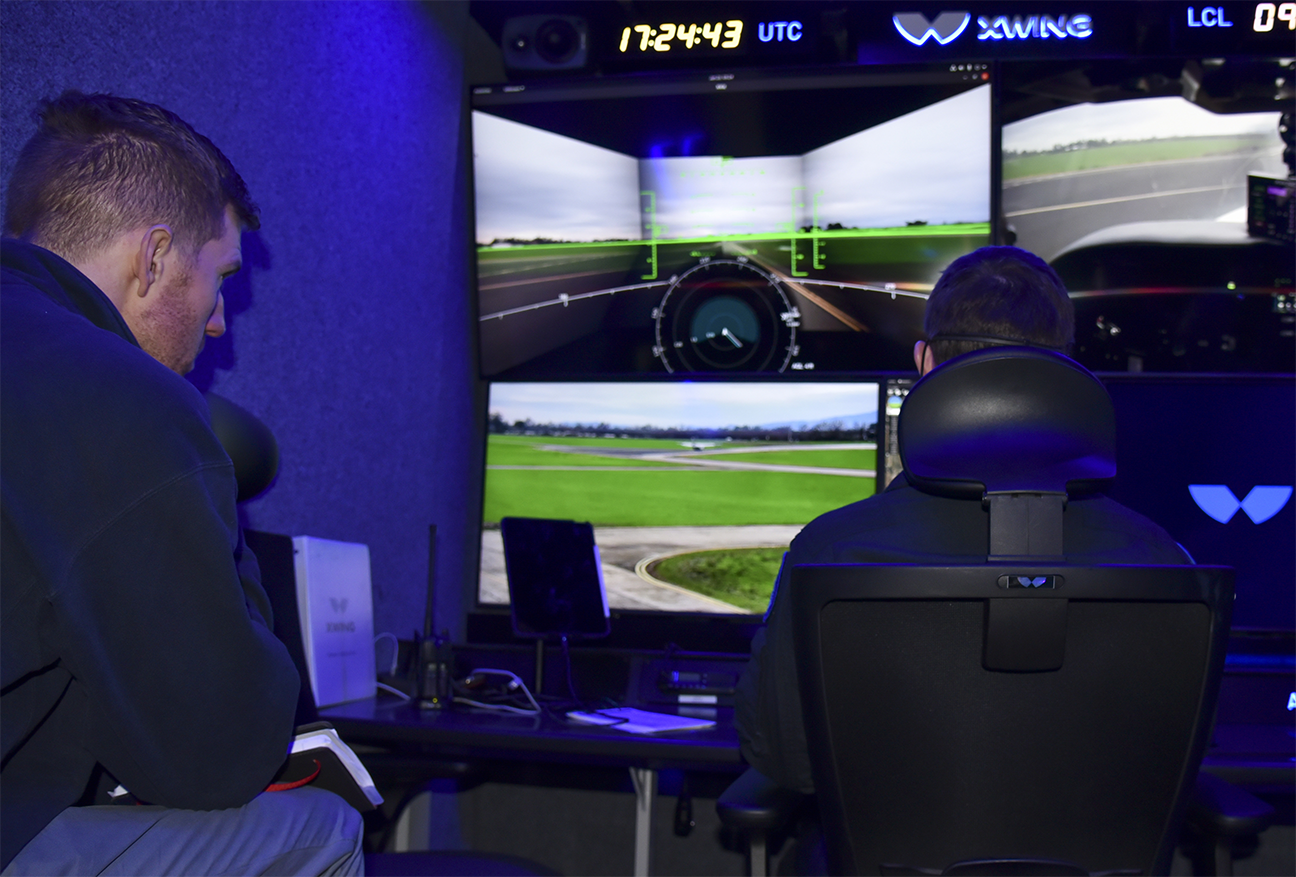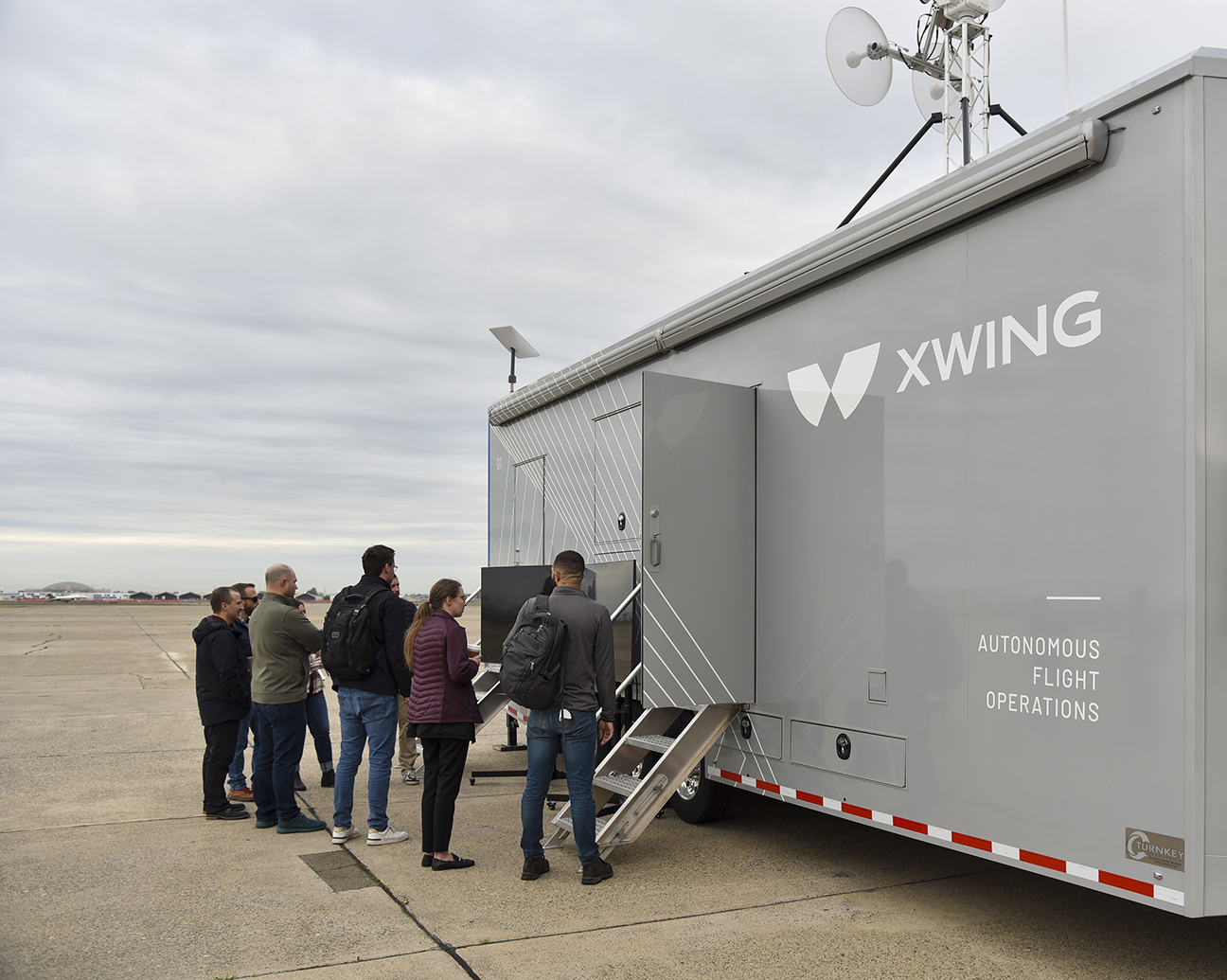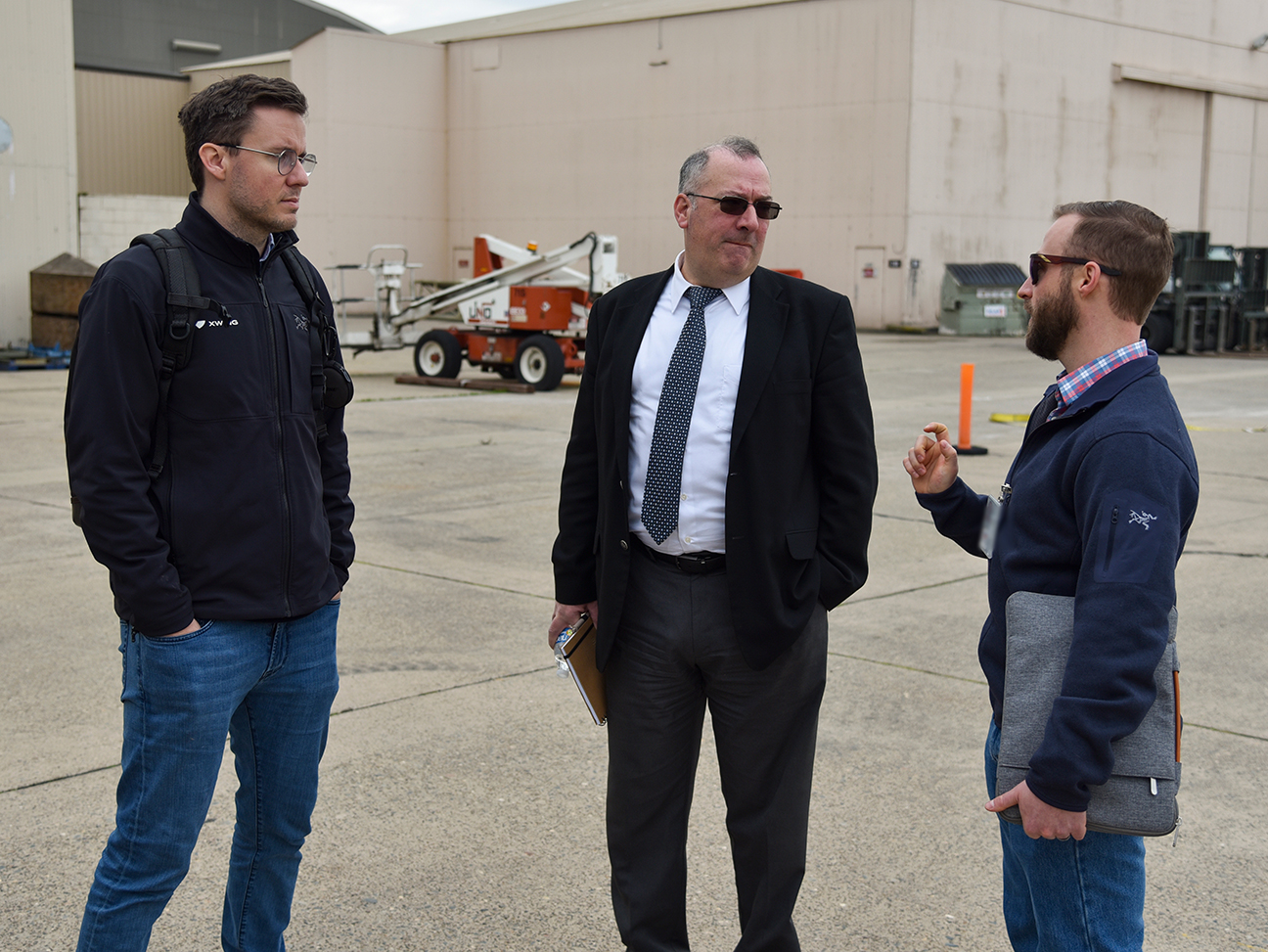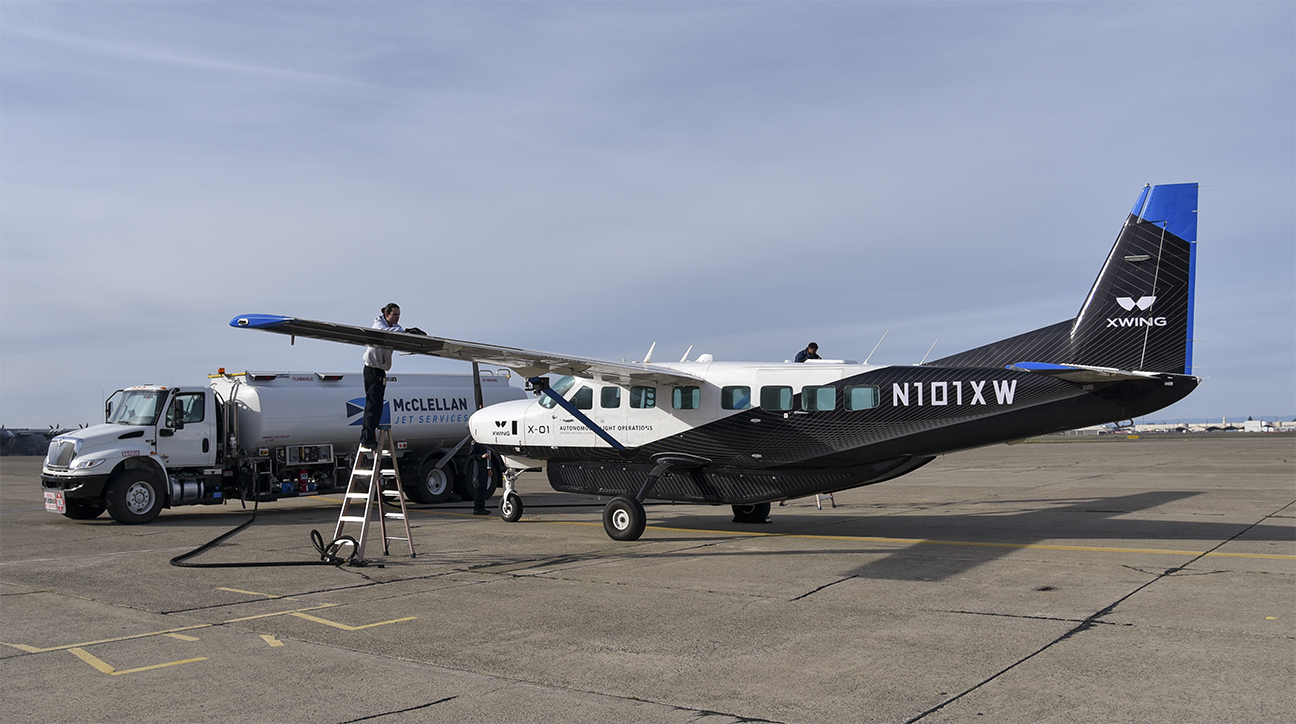AFWERX Autonomy Prime, Xwing partner for autonomous flight demonstration
SACRAMENTO, Calif. (AFRL) – AFWERX Autonomy Prime partner Xwing Inc. successfully completed an autonomous logistics mission in its Cessna 208B as dozens of Airmen watched from a ground control station at McClellan Airfield in Sacramento, California, Jan. 26, 2024. Xwing’s autonomous flight technology allows its aircraft to taxi, take off, fly to a destination, avoid airborne and ground obstacles, and land, without any human input.
“To see an aircraft takeoff, fly and land by itself, was fascinating to see,” said Maj. Thomas Davis, Pacific Air Forces Future Capabilities branch chief.

Air Force Maj. Thomas Davis, left, Pacific Air Forces Future Capabilities branch chief, and Craig Milliard, Xwing flight test manager, observe autonomous flight operations from a ground control station at McClellan Airfield in Sacramento, California, Jan. 26, 2024. Xwing’s autonomous flight technology allows its aircraft to taxi, takeoff, fly to a destination, avoid airborne and ground threats, and land, without any human input. (U.S. Air Force photo by Matthew Clouse)
Airmen arrived at the ground control station around 9 a.m. and were briefed by Xwing employees about their capabilities as they watched a live feed of the Cessna performing autonomous takeoffs and landings at the Yolo County Airport in Davis, California. The demonstration quickly turned into an opportunity for Xwing to showcase its capabilities in a representative operational environment. Air Force operational leaders asked if the Xwing aircraft could pick up cargo at March Air Reserve Base, California, and deliver it to McClellan Airfield instead of using traditional heavy-lift aircraft.
“Demonstrating the capability in an operationally relevant environment is a technical milestone in a capability’s technical readiness and we wanted to check that box,” said Ian Clowes, AFWERX Prime stakeholder engagement lead. “And to get that opportunity when we only planned on a demonstration was a win for AFWERX and the Air Force.”

Airmen observe autonomous flight operations from a ground control station at McClellan Airfield in Sacramento, California, Jan. 26, 2024. AFWERX, the innovation arm of the Department of the Air Force, has awarded Xwing two Small Business Innovation Research contracts, a Phase Two in March 2023 to conduct autonomous flight trials and optimize the technology for future missions and a Phase Three in December 2023 to demonstrate the capability in an operationally relevant environment. (U.S. Air Force photo by Matthew Clouse)
Autonomy Prime is the newest technology program in Prime, a division within AFWERX, and is focused on the development and implementation of emerging autonomous technologies. Similar to other Prime programs, Autonomy Prime partners with the private sector to accelerate testing and affordably deliver game-changing technology to the warfighter. AFWERX has awarded Xwing two Small Business Innovation Research contracts, a Phase Two in March 2023 to conduct autonomous flight trials and optimize the technology for future missions and a Phase Three in December 2023 to demonstrate the capability in an operationally relevant environment.
Autonomy Prime invited Air Force leaders to McClellan Airfield to watch Xwing demonstrate how autonomous aviation can contribute to the Agile Combat Employment (ACE) concept, which is to disperse aircraft and equipment between major hub bases and smaller airfields to improve resilience and survivability.

From left, Arthur Dubois, Xwing vice president of engineering and programs, Dr. Albert Lowas, Air Mobility Command chief scientist, and Beau Griffith, AFWERX Agility Prime deputy lead, discuss autonomous capabilities at McClellan Airfield in Sacramento, California, Jan. 26, 2024. AFWERX, the innovation arm of the Department of the Air Force, has awarded Xwing two Small Business Innovation Research contracts, a Phase Two in March 2023 to conduct autonomous flight trials and optimize the technology for future missions and a Phase Three in December 2023 to demonstrate the capability in an operationally relevant environment. (U.S. Air Force photo by Matthew Clouse)
“This technology has huge applications in the near-term for dispersed logistics and supports our ACE concept,” Davis said. “Autonomous technologies would also help alleviate some of the Air Force’s manpower shortages.”
Xwing operates N101XW, a Cessna 208B Grand Caravan. The aircraft is 41 feet long, 15 feet tall, with a 52 foot wingspan and a maximum payload of 3,000 pounds. N101XW flew its first autonomous flight in 2020 and has since flown more than 500 autonomous flight hours across 250 flights.

Xwing’s autonomous aircraft, N101XW, a Cessna 208B Grand Caravan, receives fuel before taking off at McClellan Airfield in Sacramento, California, Jan. 27, 2024. Xwing’s autonomous flight technology allows its aircraft to taxi, takeoff, fly to a destination, avoid airborne and ground threats, and land, without any human input. (U.S. Air Force photo by Matthew Clouse)
Data collected from those test flights show it can fly roughly 1,150 miles with 1,200 pounds of cargo. While today’s payload was much lighter, the aircraft landed back at McClellan Airfield at 8:20 p.m. with the equipment requested by Air Force leaders, the successful autonomous logistics mission proved that safe and effective autonomy solutions can benefit the Air Force.
“Now that I’ve seen this technology, I’m going to talk with my leadership about a possible use case so we can help guide these companies in better ways to support the Department of Defense,” Davis said.
About AFRL
The Air Force Research Laboratory is the primary scientific research and development center for the Department of the Air Force. AFRL plays an integral role in leading the discovery, development, and integration of affordable warfighting technologies for our air, space and cyberspace force. With a workforce of more than 12,500 across nine technology areas and 40 other operations across the globe, AFRL provides a diverse portfolio of science and technology ranging from fundamental to advanced research and technology development. For more information, visit www.afresearchlab.com.
About AFWERX
As the innovation arm of the DAF and a directorate within the Air Force Research Laboratory, AFWERX brings cutting-edge American ingenuity from small businesses and start-ups to address the most pressing challenges of the DAF. AFWERX employs approximately 325 military, civilian and contractor personnel at six hubs and sites executing an annual $1.4 billion budget. Since 2019, AFWERX has executed 4,697 new contracts worth more than $2.6 billion to strengthen the U.S. defense industrial base and drive faster technology transition to operational capability. For more information, visit: www.afwerx.com.
